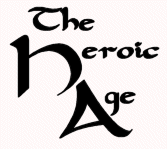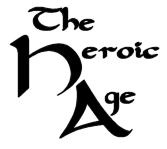Introducing 'babelisms'
Eileen A. Joy
Southern Illinois University Edwardsville
© 2008 by Eileen A. Joy. All rights reserved. This edition copyright © 2008 by The Heroic Age. All rights reserved.
Historicism contents itself with establishing a causal connection between various moments in history. But no fact that is a cause is for that very reason historical. It became historical posthumously, as it were, through events that may be separated from it by thousands of years. A historian who takes this as his point of departure stops telling the sequence of events like the beads of a rosary. Instead, he grasps the constellation which his own era has formed with a definite earlier one.
—Walter Benjamin, "Theses on the Philosophy of History"
§1. Beginning with this issue of Heroic Age, "babelisms" will be a regular column featuring essays jointly solicited and edited by Heroic Age and the BABEL Working Group. The BABEL Working Group, a non-hierarchical collective of scholars working primarily in medieval studies, was founded in 2004 for the purposes of creating new venues for the development of a more present-minded medieval scholarship and a more historically-minded contemporary humanities, and for collaboration with scholars working in more modernist disciplines and the sciences in order to formulate new "critical humanisms."1 The essays featured here, beginning with Daniel M. Murtaugh's "Absent Beowulf," will focus primarily on the artifacts—real and fictional, textual and otherwise—of early northwestern Europe, while also drawing connections between those artifacts with more modern arts and letters and with postmodern critical thought. Our hope is that these essays will demonstrate an early literary and historical studies that are attentive to what the late Edward Said described as the "worldliness" of texts—their material existence in both past and present contexts—and that is mindful that our criticism of those texts is also "worldly"—that it embodies, in Said's words, "those processes and actual conditions in the present by means of which art and writing bear significance." We hope, further, that these essays reveal some of the ways in which, again in Said's words, "worldliness, circumstantiality, the text's status as an event having sensuous particularity as well as historical contingency, are considered as being incorporated in the text, an infrangible part of its capacity for conveying and producing meaning" (Said 1983).
§2. Reflecting upon Umberto Eco's writing in his Diacritics on the collected Amazing Adventures of Superman, where Eco "places Superman among those modern heroes of popular culture whose relation to ordinary time and to history is deliberately confused, to spare them the 'consumption' or using up that history inevitably inflicts upon its subjects," Daniel Murtaugh, in his essay, "Absent Beowulf," argues that the Beowulf-poet self-consciously inserted his legendary hero "into a history that legend cannot change, bringing him and us to the impermeable membrane that separates a slayer of monsters from men and women struggling in and consumed by history."
Next Issue: Helen Bennett, "The Postmodern Hall in Beowulf"
Notes
1. For more information on the history, mission, publications, and ongoing projects of the BABEL Working Group, see http://www.siue.edu/babel. [Back]

